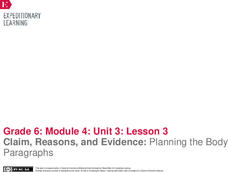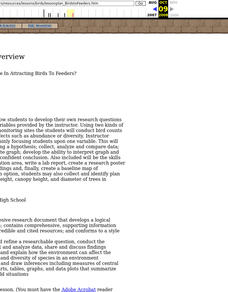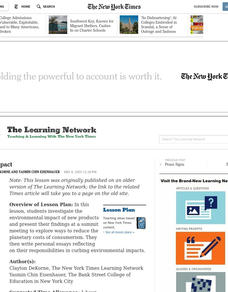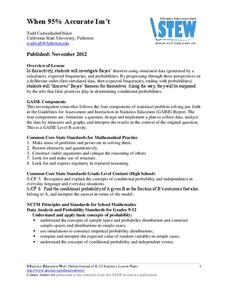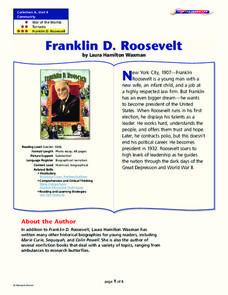Curated OER
Adolescent Sleep
Students discuss, summarize, and express alternative positions regarding a study on adolescent sleep. They examine arguments for and against changing the school start time for high-school students, based upon the findings of a scientific...
Curated OER
Science NetLinks: Adolescent Sleep
Wake up, sleepy head! High schoolers craft a creative presentation that represents how they feel when they wake up on a school morning. After the presentations, a reading of Academic Sleep Times and Academic Performance launches a...
Curated OER
The Effects of Slavery
The emotional and spiritual oppression of slavery in the African-American experience is the focus of this instructional activity. Middle schoolers analyze various texts by Frederick Douglass and Maya Angelou related to freedom and...
American Statistical Association
Chunk it!
Chunking information helps you remember that information longer. A hands-on activity tests this theory by having learners collect and analyze their own data. Following their conclusions, they conduct randomization simulations to test...
Curated OER
Children's Media and Censorship
High schoolers form opinions about children and television censorship after analyzing literature. They complete a journal writing activity to identify the topic and make a list of inappropriate television shows for children. Next, they...
EngageNY
Claim, Reasons, and Evidence: Planning the Body Paragraphs
Planning is the key to success. Scholars continue planning their essays by adding reasons to their Planning My Argument graphic organizers. Additionally, pupils analyze a body paragraph from a model position paper, identifying the...
Curated OER
After Reconstruction: Problems of African Americans in the South
Learners describe issues or problems facing African Americans following Reconstruction. They explain possible solutions to these problems suggested in the sources found and cite arguments for and against those solutions. Analyze primary...
Curated OER
When I Set My Hat at a Certain Angle: Trying on Zora Neale Hurston's Voice to Dress-up Prose
After reading and evaluating examples of prose nonfiction by Zora Neale Hurston and other authors, high schoolers write a personal reflective essay rich in figurative language. By incorporating this strategy, they utilize voice within...
National Endowment for the Humanities
Women's Equality: Changing Attitudes And Beliefs
Students analyze archival materials contemporaneous with the birth of the Women's Rights Movement, and begin to appreciate the deeply entrenched opposition the early crusaders had to overcome. They discuss whether or not such attitudes...
Curated OER
What Factors Contribute In Attracting Birds To Feeders?
Students develop their own research questions dealing with specific variables provided by the instructor; students conduct bird counts using two kinds of birdseed, and analyze possible effects such as abundance or diversity.
American Statistical Association
Chocolicious
To understand how biased data is misleading, learners analyze survey data and graphical representations. They use that information to design their own plans to collect information on consumer thoughts about Chocolicious cereal.
Constitutional Rights Foundation
Naturalized Citizens and the Presidency
Article II, Section 1 of the U.S. Constitution takes center stage in a lesson that asks class members to assume the role of state senators, debate a resolution to amend the U. S. Constitution to permit naturalized citizens to run for...
Curated OER
Deep Impact
How can acknowledging opposing viewpoints reinforce one's argument? Use this New York Times instructional activity to study consumerism and the environmental impact of new products. After reading the article "Whether a Hummer or a...
American Statistical Association
Colors Challenge!
Does writing the name of a color in a different colored ink affect one's ability to read it? Scholars design an experiment to answer this question. They collect the data, analyze the statistics, and draw a conclusion based on what they...
Statistics Education Web
How High Can You Jump?
How high can your pupils jump? Learners design an experiment to answer this question. After collecting the data, they create box plots and scatter plots to analyze the data. To finish the activity, they use the data to draw conclusions.
Statistics Education Web
When 95% Accurate Isn’t
Investigate the effect of false positives on probability calculation with an activity that asks scholars to collect simulated data generated by a calculator. To finish, participants analyze the probability of certain outcomes which lead...
American Statistical Association
Confidence in Salaries in Petroleum Engineering
Just how confident can we be with statistics calculated from a sample? Learners take this into account as they look at data from a sample of petroleum engineer salaries. They analyze the effect sample size has on a margin of error and...
Curated OER
Forty Acres? The Question of Land at the War's End
Should land be redistributed to former slaves after the Civil War? This essential question guides a lesson on the Reconstruction Era, as learners analyze primary sources (linked), recording responses on a worksheet (linked). To model the...
American Statistical Association
Bubble Trouble!
Which fluids make the best bubbles? Pupils experiment with multiple fluids to determine which allows for the largest bubbles before popping. They gather data, analyze it in multiple ways, and answer analysis questions proving they...
American Statistical Association
What Fits?
The bounce of a golf ball changes the result in golf, mini golf—and a great math activity. Scholars graph the height of golf ball bounces before finding a line of best fit. They analyze their own data and the results of others to better...
State Bar of Texas
Sweatt v. Painter
Is separate but equal actually equal? The 1950 Supreme Court case Sweatt v. Painter discusses the law of segregation and inequality. Scholars investigate the impact of the case on the desegregation of public schools across the nation...
Curated OER
How Are Boundaries Made, Kept, Broken?
Students examine the different perspectives of Igbo women. They simulate a silent debate in response to the question, "Is the Igbo society sexist?" They write their response to the question and exchange papers with their partner as the...
Curated OER
Liberty Rhetoric
What is liberty rhetoric? Examine how people have used it in four different time periods and situations. High schoolers investigate original source documents and compare them with the Declaration of Independence to decide how liberty...
Curated OER
Franklin D. Roosevelt
Discuss the life of Franklin D. Roosevelt. This story, called "Franklin D. Roosevelt" by Laura Hamilton Waxman, is used to explore comprehension skills. Some of these skills include identifying prefixes and suffixes, making comparisons,...







